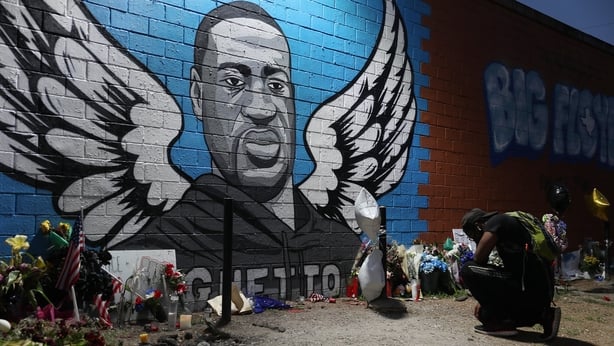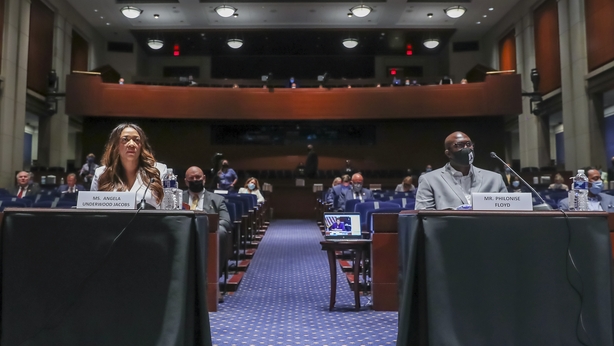The Democratic-led US House of Representatives took up the issues of police violence and racial injustice in America today, in the first congressional hearing since the death of George Floyd in Minneapolis sparked protests around the world, with Mr Floyd's brother testifying.
"Justice for George," Mr Floyd's 42-year-old brother Philonise Floyd told reporters on his way into the hearing venue.
Philonise Floyd told the US Congress to "stop the pain" by passing reforms to address and reduce police brutality.
One day after burying his brother in Houston, Philonise Floyd appeared in person before the House hearing, where he described the anguish of watching a video of George's death and demanded politicians address the systemic problems in law enforcement.
"I'm here to ask you to make it stop. Stop the pain," the younger Mr Floyd said, wiping his forehead and holding back tears.
"I can't tell you the kind of pain you feel when you watch ... your big brother, who you looked up to your whole entire life, die - die begging for his mom," he added.
"George called for help and he was ignored. Please listen to the call I'm making to you now, to the call of our family and the calls ringing out in the streets across the world," said Mr Floyd, who wore a face mask bearing an image of his brother.
"Maybe by speaking with you today, I can make sure that his death will not be in vain.
"George wasn't hurting anyone that day. He didn't deserve to die over $20. I'm asking you - is that what a black man is worth? $20?"
George Floyd's death on 25 May after a policeman knelt on his neck for almost nine minutes was the latest in a string of killings of black men and women by police that have sparked anger on America's streets and fresh calls for reforms.

"The nation demands and deserves meaningful change," House Judiciary Committee Jerrold Nadler said at the start of the hearing in the US Capitol.
"We must remember that he is not just a cause, a name to be chanted in the streets. He was a man. He had a family. He was known as a gentle giant. He had a rich life that was taken from him far too early and we mourn his loss," Mr Nadler said.
Politicians were expected to hear urgent pleas from civil rights advocates for strong reforms and more funding for social services in minority communities, as well as vocal support for police from three witnesses called by Republicans.
Some witnesses and politicians were set to participate by video link to ensure social distancing during the ongoing coronavirus pandemic.

The judiciary panel is preparing to shepherd a sweeping Democratic package of legislation, aimed at combating police violence and racial injustice, to the house floor by 4 July, and is expected to hold further hearings next week to prepare the bill for a full house vote.
The Fraternal Order of Police has welcomed the bill's introduction, saying in a statement that further discussions could produce a law capable of having a positive impact on law enforcement and policing.
Senate Republicans are working on rival legislation, due to be released on Friday, which touches on many of the same areas but emphasises the collection of data rather than changes in laws and policies in key areas.
The Republican-led Senate Judiciary Committee will hold its own hearing next Tuesday.
Today's witnesses include NAACP Legal Defense and Educational Fund President Sherrilyn Ifill and Pastor Darrell Scott, a member of US President Donald Trump's National Diversity Coalition.
The hearing also provided a platform for House Republicans, who have responded to protests by underscoring their support for police and accusing Democrats of wanting to cut off police funding, which top Democrats oppose.
"Where you demonise the police, they stop engaging with the community. If we stand with the police, it will be better for all Americans," Representative Matt Gaetz, a House Judiciary Republican, tweeted yesterday.
Meanwhile, President Trump could take policy action on race and policing via an executive order, his spokesperson told Fox News in an interview.
"We do believe that we'll have proactive policy prescriptions, whether that means legislation or an executive order," White House spokesperson Kayleigh McEnany said.
She declined to offer specifics, saying the Republican president was still weighing various possibilities.
The potential for executive action comes as both Democrats and Republicans in Congress push forward with proposals aimed at addressing police reform.
House Democrats on Monday unveiled a sweeping bill that would ban chokeholds, require body cameras for federal law enforcement officers and restrict the use of lethal force, among other steps.
Ken Cuccinelli, acting deputy secretary for Homeland Security, declined to provide details about what action Mr Trump is considering.
"You will see a mix of legislative proposals that we can work on a bipartisan basis, just like the president did with criminal justice reform, and executive actions he can take on his own," Mr Cuccinelli told Fox Business Network.
Mr Trump signed bipartisan legislation in 2018 that changed sentencing requirements and the treatment of federal prisoners.
The US President also ruled out a change to US military bases named after Civil War Confederate leaders, pushing back on pressure to rid public places of reminders of the once pro-slavery South.
...history of Winning, Victory, and Freedom. The United States of America trained and deployed our HEROES on these Hallowed Grounds, and won two World Wars. Therefore, my Administration will not even consider the renaming of these Magnificent and Fabled Military Installations...
— Donald J. Trump (@realDonaldTrump) June 10, 2020
"These Monumental and very Powerful Bases have become part of a Great American Heritage, and a history of Winning, Victory, and Freedom," Trump said in a tweet that was also read out by his spokeswoman at a press conference.
"My Administration will not even consider renaming these Magnificent and Fabled Military Installations. Our history as the Greatest Nation in the World will not be tampered with," he wrote.
"Respect our Military!"
Ten bases named after generals from the secessionist South, which lost the Civil War and its effort to preserve slavery, are in the spotlight.
They include the famous Fort Bragg, Fort Hood in Texas and Fort Benning in Georgia.
US House Speaker Nancy Pelosi called for the US Capitol's removal of 11 statues of Confederate soldiers or officials.
"Monuments to men who advocated cruelty and barbarism to achieve such a plainly racist end are a grotesque affront to these ideals" of American democracy and freedom, the top Democrat in Congress wrote to a bipartisan committee.
"Their statues pay homage to hate, not heritage," Pelosi added. "They must be removed."
